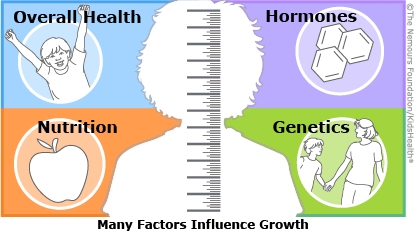Constitutional Growth Delay or Familial Short Stature: How to Care for Your Child
Kids and teens who are shorter than their peers may feel self-conscious. Offer reassurance that your child's growth pattern is normal.


Constitutional growth delay and familial short stature are two different conditions that can cause children to be shorter than their peers growing up. They aren't caused by disease and don't lead to health problems.
Children with constitutional growth delay are usually small for their ages in early childhood. They start puberty later than their peers do and have a later growth spurt — they are sometimes called "late bloomers." They often continue growing late into their teens and eventually reach a normal (or sometimes even tall) adult height.
Familial (or genetic) short stature describes short children who usually have parents or other close adult relatives who are short. Kids with familial short stature still have growth spurts and enter puberty at a normal age, but they usually reach an adult height similar to that of their parents.
In many cases, a short child may have a combination of both of these conditions.
The health care provider may perform tests (blood or X-rays) to help be sure that a hormone problem or other underlying disease isn't causing a growth problem in your child.
Because constitutional growth delay and familial short stature aren't illnesses, they don't usually need treatment. In a few children who are very short or very late entering puberty, hormone treatment may be helpful.

-
Children with these conditions sometimes become self-conscious. Listen to your child's concerns, and boost his or her self-esteem by focusing on intelligence, personality, talents, and other traits. Do not tease your child about size or delayed puberty.
-
If your health care provider has prescribed medicine, give it to your child as directed.



If your teen has constitutional growth delay and does weight training, talk to your health care provider about appropriate weights to use. Kids who are still growing should generally use lighter weights so they don't stress developing bones.